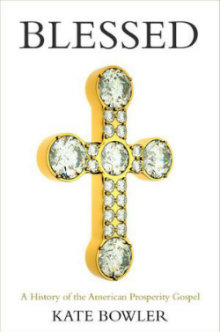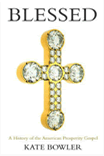Top Ten Books of 2013 - #5
December 27, 2013 2 CommentsBlessed: A History of the American Prosperity Gospel, by Kate Bowler
This book is simultaneously informative and infuriating. It is the most comprehensive history of the so-called “prosperity gospel” and its purveyors yet to be published. Kate Bowler is Assistant Professor of American Religion at Duke Divinity School. She is to be commended for her meticulous research and the eminently readable way in which she portrays this deviant and profoundly unbiblical expression of American Pentecostal / Charismatic religious life. Keep reading...
 Blessed: A History of the American Prosperity Gospel, by Kate Bowler (New York: Oxford University Press, 2013), 337 pp.
Blessed: A History of the American Prosperity Gospel, by Kate Bowler (New York: Oxford University Press, 2013), 337 pp.
This book is simultaneously informative and infuriating. It is the most comprehensive history of the so-called “prosperity gospel” and its purveyors yet to be published. Kate Bowler is Assistant Professor of American Religion at Duke Divinity School. She is to be commended for her meticulous research and the eminently readable way in which she portrays this deviant and profoundly unbiblical expression of American Pentecostal / Charismatic religious life.
Why is this book infuriating? Certainly not because it is inaccurate or misrepresents the people who promote this view of Christianity. Bowler is fair and forthright with her subject. It’s infuriating because it forces the reader to acknowledge the pervasive presence and influence of this perspective in America and the long-term destructive effects it will have on the lives of countless unsuspecting Christians.
Bowler is not a biblical scholar. She makes no attempt to refute the pathetic interpretations of Scripture one regularly finds among the proponents of prosperity. This is more a sociological study that tries to identify both the essence of this “gospel” and the underlying appeal that explains why it is so widespread and popular.
What, then, are the unifying themes of the prosperity gospel? Says Bowler, “the prosperity gospel . . . centers on four themes: faith, wealth, health, and victory. (1) It conceives of faith as an activator, a power that unleashes spiritual forces and turns the spoken word into reality. (2) The movement depicts faith as palpably demonstrated in wealth and (3) health. It can be measured in both the wallet (one’s personal wealth) and in the body (one’s personal health), making material reality the measure of the success of immaterial faith. (4) The movement expects faith to be marked by victory. Believers trust that culture holds no political, social, or economic impediment to faith, and no circumstance can stop believers from living in total victory here on earth” (7).
I wish I could list all the people mentioned by Bowler, but most of them are already well-known. Simply turn on the TV! What I found especially insightful comes in the concluding chapter where she asks the question: “What does the prosperity gospel offer to its believers?” (232). She insists that “we must not think that it is simply the lure of financial success” (232). In other words, there is more to its appeal than good old-fashioned greed (although that is certainly a major factor). She explains:
“On one level, the appeal of prosperity theology is obvious. The faith movement sells a compelling bill of goods: God, wealth, and a healthy body to enjoy it. But it is the enjoyment, the feelings that lift believers’ chins and square their shoulders, that is its fundamental achievement. The first step in accessing this good news is the belief that things can get better. The prosperity gospel’s chief allure is simple optimism” (232).
There is so much more I could say about this excellent volume, but I’ll close with this. If you are disinclined (as I am) toward this particular aberration within the Pentecostal/Charismatic movement, this book will supply abundant grist for your mill!

2 Comments
Sharon Dec 30, 2013 @ 9:45 am
I think Alistair has asked some very good questions. I've often thought that one of the issues with prosperity teaching is that there is a KERNEL of truth in it; the problem is that it is not balanced with other principles of the gospel message. I've often had the impression that prosperity teaching especially appeals to people who feel downtrodden and helpless, promising easy and inevitable solutions to their problems.
One of the most obvious problems I see with it is that it is encourages a self-centered mindset and ignores the model of suffering and sacrificing for the sake of the Kingdom that was demonstrated by the NT church.
Alistair Robertson Dec 30, 2013 @ 12:20 am
Sam, I haven't read this book, but I have come up with a theory about prosperity teachers that I would like you to consider. That is, that, beyond optimism, prosperity teachers actually provide practical teaching about how to live your life for people unequipped for life. Add to that the extra motivator that it is God who is providing them with these "how to" principles (however poorly derived from Scripture) and you actually have a very compelling "product".
I also question whether this is all bad. Absolutely, the four themes outlined above are corrosive to Christian faith should they be nakedly promoted, but the prosperity teachers I've heard actually have quite a mixture in their teaching, including some actual gospel teaching! So my questions are as follows:
1. Are the non-biblical aspects of a prosperity preacher's teaching all unbiblical or is there actually some good advice thrown in there?
2. How does the mixture of true and false in prosperity preaching compare to the mixture of true and false in other churches? Is it worse, or is it just more visible to those outside? Is God working through prosperity preachers, or is their teaching so bad that it has no redeeming value?
3. Do other churches need to take note of the fact that prosperity preaching catches the ear of the poor, wounded and afflicted as empowering and consider how the true gospel actually lifts up the poor, wounded and afflicted?
I ask these questions in all sincerity, acknowledging the damage those naked themes can do, but at the same time remembering how God has used many people in the past we would now consider beyond orthodoxy.
Write a Comment
Comments for this post have been disabled.